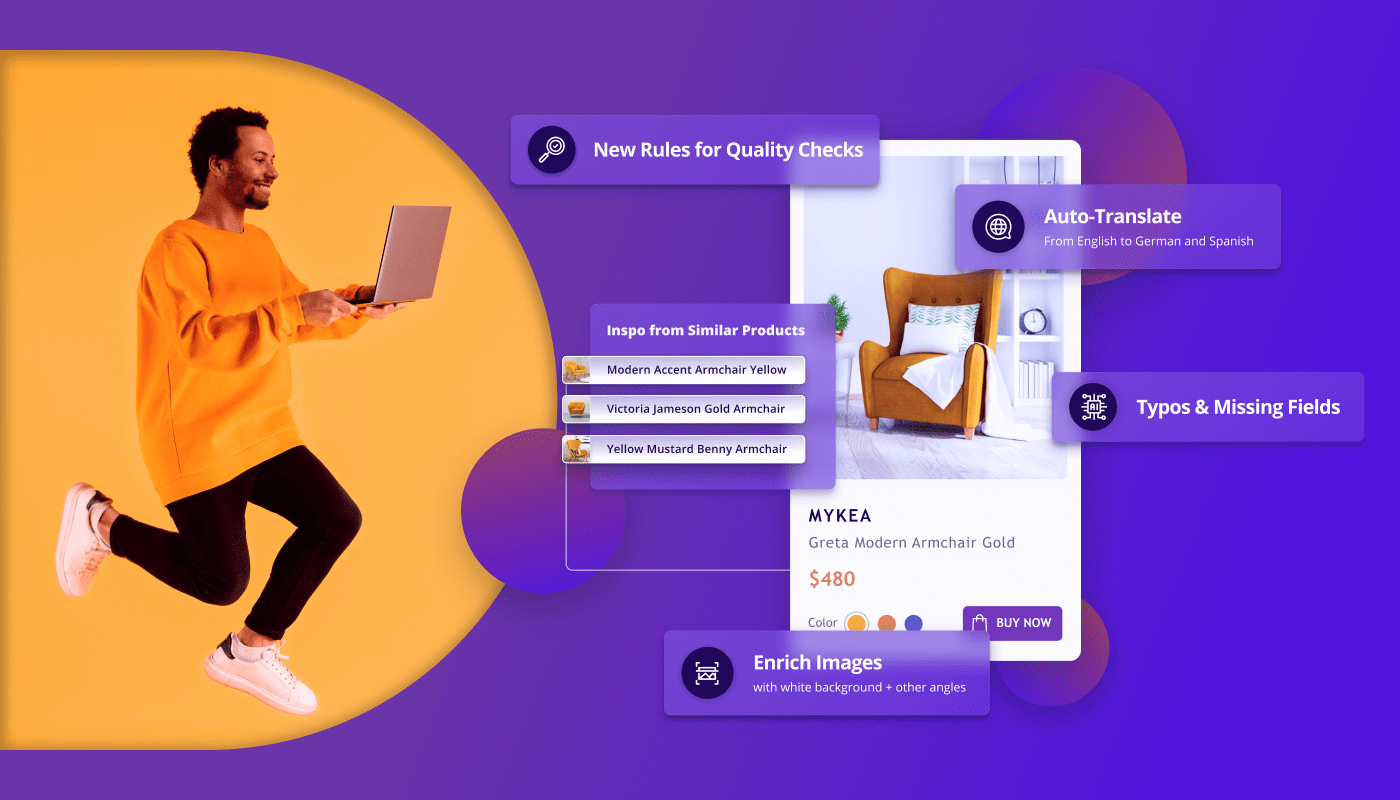From informing buying decisions to building trust and credibility, product information serves as the backbone of ecommerce success by empowering consumers, reducing friction, and facilitating seamless shopping experiences. That’s why, in today's fast-paced and hyper-competitive digital landscape, selecting the right Product Information Management (PIM) solution can make all the difference for enterprises aiming to stay ahead of the curve.
And, the right PIM solution can vary significantly depending on the unique characteristics, needs, and objectives of each organization. The selected tool should completely fit existing workflows and technology stack while catering to specific industry and buyer expectations. In this comprehensive guide, we delve into the key challenges around product information management and provide a 4-category checklist for choosing the optimal PIM solution to propel your organization toward further success.
Product Information Management Challenges.
With vast product catalogs, multiple sales channels, and complex supply chains to manage, large enterprises face ever-growing challenges in managing their product portfolio. One of the primary challenges is maintaining data consistency and accuracy across this wide array of products and channels. With extensive product catalogs spanning multiple categories, brands, and variants, ensuring that product information remains consistent and up-to-date poses a significant hurdle. This is compounded by the involvement of multiple teams and departments in product management, each with its own processes, systems, and data sources, leading to potential inconsistencies and errors in product data.
Enterprises struggle to achieve a single source of truth for product data, leading to inefficiencies, errors, and missed opportunities for strategic decision-making and customer engagement.
Large enterprises also grapple with the complexities of global operations and diverse market requirements. Operating in multiple countries and regions entails adhering to diverse regulatory standards, language preferences, cultural nuances, and market trends. Consequently, managing product information in a globally distributed environment becomes challenging, as teams must navigate regulatory compliance, localization, and customization to meet the specific needs of each market while maintaining brand consistency and integrity.
Integrating disparate systems and data sources poses a significant challenge as well. With complex IT infrastructures comprising a myriad of legacy systems, ERPs, CRMs, ecommerce platforms, and third-party applications, achieving seamless connectivity and data synchronization becomes a daunting task. Enterprises often face interoperability issues, data silos, and inconsistencies between systems, hindering the flow of accurate and timely product information across the organization and its external partners.
Key Factors to Consider for the Best-Fit PIM.
PIM solutions are software platforms designed to centralize, organize, and manage product information across various channels and touchpoints. They serve as a centralized repository for product data, enabling enterprises to create, enrich, update, and distribute product information consistently and efficiently.
PIM solutions typically offer a range of features and functionalities to address the challenges faced by large enterprises in product information management. From effortlessly providing a single source of truth to automating management flows, here are 4 areas where PIM solutions can make an impact (with the bonus of related Rierino PIM features in each category):
1. Easy Fully-Customizable Product Enrichment
PIM solutions empower enterprises to enrich their product information with custom attributes, ensuring that each product listing is tailored to meet specific market requirements and customer preferences. For example, a clothing retailer can utilize a PIM solution to enrich product listings with attributes such as size, color, material, and care instructions, allowing customers to make informed purchasing decisions. Moreover, PIM solutions enable enterprises to customize attributes based on unique product characteristics or industry standards. For instance, an electronics manufacturer can add technical specifications such as processor speed, memory capacity, and connectivity options to product listings, catering to tech-savvy consumers.
By offering flexibility and scalability, PIM solutions streamline the process of product enrichment, empowering enterprises to create compelling and comprehensive product listings across various channels and touchpoints.
With Rierino PIM’s hyperflexible data model, the ability to apply even the most complex changes becomes faster and easier. For instance, a furniture retailer can enrich product listings with 3D models that allow customers to visualize how a piece of furniture will look in their home without writing a single line of code. Similarly, a cosmetics brand can instantly display user-generated content on its product pages for a more comprehensive representation of the product experience from its actual users.
Additionally, Rierino PIM accelerates multi-country, multi-currency, and marketplace listings with one-click translations. This feature enables enterprises to seamlessly localize product information for different markets and streamline the process of listing products on various ecommerce platforms.
2. Data Quality Checks for The Perfect Product Content
With product data coming from multiple sources, ensuring data quality and consistency without manual repetitive controls is a critical requirement. PIM solutions play a crucial role in supporting product data quality checks and improvements by providing robust tools and functionalities to ensure that product information is accurate, consistent, and compliant with industry standards. These typically include data validation features that automatically identify and flag inconsistencies, errors, or missing information in product listings.
Additionally, PIM solutions enable enterprises to define and enforce their own data governance policies, validation rules, and workflows to maintain data integrity throughout the product lifecycle. For example, a consumer electronics manufacturer can use a PIM solution to enforce rules that validate product specifications against industry standards, ensuring that all product data meets predefined criteria.
Moreover, PIM solutions facilitate the correction of identified data quality issues by offering related workflows and collaboration tools.
In this context, Rierino PIM goes beyond traditional capabilities by offering advanced features such as out-of-the-box Natural Language Processing (NLP) and image-processing controls that enhance data quality and enrichment. With NLP capabilities, Rierino PIM automatically analyzes product descriptions, attributes, and metadata to extract relevant information and ensure data accuracy. Furthermore, Rierino PIM allows enterprises to enrich data at any time with their own category, channel, or context-specific rules, ensuring flexibility and adaptability to evolving business needs.
3. Workflows Optimized for Your Business
Streamlined workflows play a crucial role in eliminating redundant inefficient tasks throughout product information management. PIM solutions should offer customizable workflows that allow organizations to optimize their interactions and shorten time to value. For example, an organization can create sequential or parallel workflows that align with the internal approval processes while saving time. PIM solutions also enable enterprises to assign specific roles and permissions to users based on their responsibilities and expertise. For instance, a marketing manager may have the authority to edit product descriptions and images, while a compliance officer may be responsible for ensuring that product information meets regulatory standards.
By offering tailored workflows and role-based access controls, PIM solutions enhance efficiency and accountability across cross-functional teams.
With Rierino PIM, enterprises can introduce mission-specific roles and deadlines to customize workflows according to their unique business requirements. For example, a retail organization can create role-specific workflows for new product introductions, seasonal promotions, or clearance events, ensuring that product information is managed efficiently and timely.
Moreover, Rierino PIM offers seamless integration with evolving technology stacks, allowing enterprises to leverage their existing ERP systems and other business applications without added complexity. By integrating with existing systems, Rierino PIM extends the capabilities of the ERP system, enabling enterprises to centralize product information management while leveraging the data and processes already in place. This integration streamlines operations, reduces duplication of efforts, and enhances overall efficiency and productivity.
4. Unique and Memorable Product Experiences
As our 2023 Ecommerce Shopper Trends survey revealed, shoppers expect better product experiences with 75% stating they had information issues while shopping online. PIM solutions should be able to close this gap by providing tools and features that enhance product presentation and engagement. From creating curated collections that showcase complementary items or seasonal trends to listing related products and accessories, a central PIM can support the discovery of new products and inspirations.
PIM solutions also support associated content features enabling enterprises to enrich product listings and drive customer engagement.
With Rierino PIM, enterprises can quickly curate both fixed and dynamic product collections tailored to specific customer segments or marketing campaigns. For example, a fashion retailer can create curated collections for holiday gift guides or trend-inspired looks, driving excitement and urgency among shoppers. Furthermore, Rierino PIM enables enterprises to customize product information for different channels and segments, tailoring content and messaging to resonate with specific audience demographics or market segments. By linking related content with products, such as tutorials, user guides, or customer testimonials, Rierino PIM enhances engagement and usability, delivering memorable product experiences that foster brand loyalty and advocacy.
How to Approach PIM Solution Selection.
For enterprises considering the adoption of a PIM solution, the journey towards selecting the right platform can be a daunting yet rewarding endeavor. Here's a step-by-step approach to effectively navigate the selection process:
Define and Prioritize Business Goals:
- Identify the specific challenges and pain points in your current product information management processes
- Define clear and measurable business goals that you aim to achieve with the implementation
- Prioritize these goals based on their strategic importance and potential impact on KPIs
Conduct a Comprehensive Needs Assessment:
- Assess your unique requirements considering factors such as organizational structure and market dynamics
- Engage stakeholders from various departments to gather insights and perspectives on their specific needs
- Create a detailed list of functional and technical requirements based on all the inputs
Research and Compare Solutions:
- Leverage subject specialists such as PIMVendors, G2, or SourceForge to identify leaders and innovators
- Evaluate the features and functionalities against your list of requirements
- Request demos or trials from shortlisted vendors to gain hands-on experience with solutions
Make the Decision:
- Gather feedback from internal stakeholders and decision-makers to ensure consensus and buy-in
- Evaluate the total cost of ownership (TCO) including upfront and maintenance fees
- Make an informed decision based on overall fit, value proposition, and potential ROI
By following this systematic approach, enterprises can effectively navigate the PIM solution selection process and choose the solution that best meets their business goals, requirements, and strategic objectives.
Getting Started with Rierino PIM.
Careful planning, thorough research, and strategic decision-making allow businesses to leverage the power of PIM solutions to streamline their product data management processes, enhance customer experiences, and drive business growth. Rierino PIM is designed to go beyond traditional capabilities to empower enterprises with innovative features and functionalities tailored to meet their unique needs and objectives. With features such as customizable workflows, advanced data quality checks, and support for dynamic product collections and associations, Rierino PIM empowers enterprises to achieve their business goals and drive success in an increasingly competitive landscape.
With Rierino PIM as your trusted partner in product information management, you can unlock new opportunities for innovation, efficiency, and growth, positioning your enterprise for success in the digital age. If you are an ambitious organization looking to upgrade your PIM capabilities, get in touch with our experts today to find out how Rierino can accelerate your in-house innovation.



